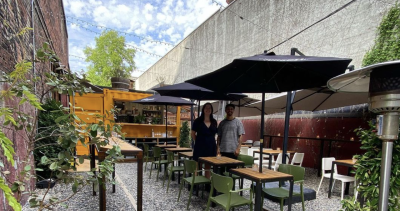David Johnston: The north matters—and that's why I support the LNG Canada project
By David Johnston
A year ago, a group of northern residents got together to ask a simple question: what can we do to counter opposition to LNG development given the majority of residents in the north support it, and people like David Suzuki, who, in an opinion piece published in the Georgia Straight this week, continue to pit the economy against the environment at a time that we need to strike a balance and ensure we are addressing both.
At our initial meeting, we recognized that in general, people that oppose projects are more vocal than people who support them and decided on the spot to change that. Like the opponents to LNG development, we demonstrated. In our case, we built a float and paraded it through town with signage clearly stating: “We want LNG Canada.”
We created the hashtag #TheNorthMatters. We printed thousands of signs that overnight popped up on people’s lawns. And we continue to respond to articles that we believe to be untrue.
We don’t do this because we have nothing better to do. We do this because living in the north of British Columbia, it is much easier to see firsthand the important connection between economic development and social sustainability. Our communities need jobs because without them, it is not sustainable to live in the communities we love. While the unemployment rate recently dropped to under five percent in Vancouver, it hovers at close to double that in the north, with about one in 10 people looking for work. And this situation is significantly worse for our Indigenous neighbours.
At the peak of construction, the LNG Canada project, together with the coastal GasLink pipeline project, will employ about 10,000 people. While I recognize only some of those jobs will be filled by people in B.C.’s northern communities, there should be enough opportunity for anyone in northern B.C. with the required skills to be gainfully employed. Even more importantly, the company’s commitment to a portion of the workforce being reserved for apprentices, means that our young people can begin their training and careers at LNG Canada. In addition to learning on the job, earning a livable wage and gaining transferable skills, our sons and daughters can remain living in the communities they were born in, and not have to leave for southern B.C. where jobs are more plentiful.
Whether we were born in northern B.C. or moved here to be closer to nature and the outdoors, we would not be saying yes to LNG development if we thought for a moment it would negatively impact the environment that we enjoy every day. No one is asking for a job at the expense of the environment.
We did our research before we said yes. We talked with residents of upstream communities where hydraulic fracturing occurs. We looked at the work that had been done to understand that climate change is a global issue, and perhaps the greatest contribution Canadians can make is to use our abundant natural resources to help countries like China replace the use of coal with the use of natural gas. The many of us in the north that support LNG Canada don’t understand why the company isn’t getting credit for the work it did to deliver a world-class project that will be the best performing in the world—emitting half of the CO2 emissions of any other large project currently operating in the world today.
We also know that Suzuki’s characterization of government’s removal of a tax that was unfairly LNG-industry specific as a subsidy, is far from what really occurred—government creating a level playing field with other industries within our province, and outside so B.C. and Canadian projects can be competitive globally.
At the close of his article, Suzuki laments that the people who are supposed to represent our interests lack imagination and foresight. It’s likely easier to do that when there is only a single issue on your plate. But in the real world where our families live, we need to strike a balance between protecting our planet and ensuring there is food on the table to eat. One should not be considered without the other. I believe projects like LNG Canada that have worked to reduce their emissions, that will make a difference to global climate challenges, and that provide abundant economic development opportunities for individuals in terms of employment, and for the province and country in terms of tax revenue for hospitals and schools, need to be considered and supported.
It all matters—climate, the environment and the economy. And the north.















Comments